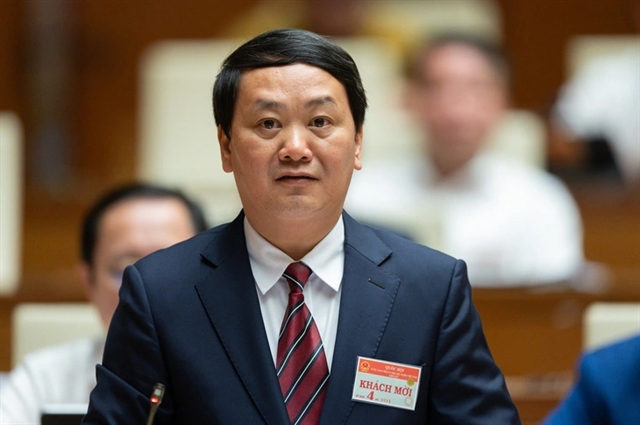.jfif) Opinion
Opinion

 |
| Hầu A Lềnh, chairman of the Committee for Ethnic Affairs. — Photo courtesy of the National Assembly. |
The Party and the State have shown special concern for creating sustainable livelihoods and stabilising the lives of ethnic minorities and mountainous communities. On the occasion of the Lunar New Year, Tin Tức newspaper talked with Hầu A Lềnh, Party Central Committee member and chairman of the Committee for Ethnic Affairs, regarding the programmes, policies and social security for the people in ethnic minority regions.
Could you provide an overview of the results of implementing policies for ethnic minorities and mountainous areas in the past year?
The year 2023 marked the implementation of the resolutions of the 13th National Party Congress and the third year of the national target programme for socio-economic development in ethnic minority and mountainous areas (EM&MA). The Committee for Ethnic Affairs (CEA), as the State agency responsible, has diligently and actively implemented policies nationwide.
We deeply adhered to the Party's directives, strategies and the legal framework of the State. Specifically, we focused on implementing the national target programme for the socio-economic development of EM&MA, outlining measures in coordination with ministries, sectors and localities to review and improve institutional structures, documents and guidelines for programme implementation.
We addressed difficulties and obstacles at the local level by organising conferences to gather opinions and recommendations during programme implementation. When localities raised concerns, the CEA collaborated with ministries and sectors to address and resolve issues.
Simultaneously, we provided advice to the Government and the Prime Minister to amend certain regulations related to ethnic policies. Apart from the NTP, the CEA also provided advice to the Prime Minister on amending certain policies for EM&MA, specifically Decision 12/QĐ-TTg regarding policies for reputable individuals and some initiatives to implement the Strategy for Ethnic Affairs for the 2010-30 period and vision to 2045.
Alongside these efforts, we also carried out other tasks assigned by the Prime Minister and the Government.
Looking back at 2023, we believe that major tasks assigned by the Prime Minister to the CEA have been essentially fulfilled. Despite the immense workload, short time frame, high demands and the need for adjustments in mechanisms, the officials at all levels of ethnic affairs have exerted great efforts and actively advised the Party and Government authorities for relatively effective implementation.
During the implementation process, the CEA integrated policy implementation with social security, particularly addressing ongoing challenges such as housing, domestic water supply, agricultural land, education, healthcare and other areas nationwide.
To ensure additional resources for implementing social security policies in EM&MA, how has the CEA advised the Party and the State on these policies?
The Party and the State have developed numerous social security policies to address the challenges faced by ethnic minorities, and these have been integrated into the NTP. The CEA has collaborated with ministries, sectors and localities to fully implement existing policies. Additionally, the CEA has worked with various agencies to evaluate the social security system for ethnic minorities nationwide and has completed assessments for reporting at the 8th plenum of the 13th Party Central Committee.
To implement social security policies in the future, one significant solution the CEA will deploy is mobilising resources beyond the State budget to support EM&MA. We see this as a correct strategy of the Party and the State. With our responsibilities, the CEA advises the Party and the Government to assign tasks to the Fatherland Front, political and social organisations, and localities. Localities are always willing to allocate resources to support their people, especially for ethnic minorities in remote, deep, and border areas during natural disasters and fires.
What proposals or recommendations does the minister have for the implementation of social security policies in EM&MA? Are there any concerns during the process of implementing and deploying these policies for ethnic minorities and mountainous areas?
From the perspective of a State management agency for ethnic affairs and ethnic policies, we have collaborated with ministries and sectors to provide numerous policy recommendations to the Party and the State. The most significant issue during the construction of the national target programmes was the combination of investment policies with social security policies, which is the most crucial aspect.
We actively participated with ministries to report to authorities authorised to issue special policies for ethnic minority groups, such as those related to education, employment solutions, vocational training, etc. Despite our comprehensive policy system covering various aspects of social life, there are still many challenges for ethnic minorities due to both objective and subjective factors, especially the impacts of climate change, diseases, and domestic and international factors affecting the lives of ethnic minorities. Therefore, much work remains to be done in the future.
My biggest concern is how to raise awareness among ethnic minorities to enhance self-awareness and self-reliance in life. We hope that, with their roles and responsibilities, ethnic minorities will increasingly rise to prosperity with their own cultural identities.
There needs to be a robust mechanism and solutions to address necessary issues for our people today, such as housing, land, economic restructuring, production models, vocational training and employment for ethnic minorities. Furthermore, investments in comprehensive infrastructure systems, electricity systems, transportation systems and physical facilities like schools and cultural houses are essential to serve ethnic minorities. These issues have been invested in many places, but they still cannot meet the aspirations of the people. These are issues that need further research to propose more comprehensive and inclusive policies in the future.
With the responsibility of the CEA along with ministries, sectors and localities, we will report these issues in the future, following the directions of the Government and the Prime Minister, especially the summary of implementing the national target programmes for the 2021-25 period and preparations for building the content of the national target programmes for the 2026-30 period. We need a comprehensive policy system in line with the spirit of the resolution of the 8th plenum of the 13th Party Central Committee. — VNS




